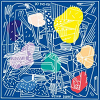It’s often said that Nirvana only fully found the sound they would make their own because of the aesthetic direction urged by their first label, Sub Pop. Whether or not this particular claim is true, a similar phenomenon is commonplace in electronic music: when a talented producer gains a critical mass of momentum, his or her productions often shift just a little, this way or that, to fit a broad variety of labels interested in the tunes they offer. When all goes well, an artistic personality is honed, rather than diluted, in the process, and the mature producer emerges with a vibe unmistakably their own, but nevertheless flexible. If this is the recipe, Jus-Ed has started with the finished dish, and cooked in reverse. Excepting only the occasional single, all of his releases in the past six years have come out on his own Underground Quality, the label which forms the core of a happy, NYC-centered house family who all seem happily to do their own thing. In this light Jus-Ed’s latest album, on Tokyo’s Mule Electronic, is a major departure.
Jus-Ed’s name looks like a good fit for the Mule roster: labelmates DJ Sprinkles and Kuniyuki Takahashi also specialize in reduced yet coruscatingly individual deep house styles. The question, then, is why Jus-Ed decided to break with a staunch tradition of musical isolationism to release a full album on someone else’s label. And, more importantly, was he wise to do so? For the answer to the first question, you’d be better off asking Edward McKeithen. The answer to the second is that — and this is said with love — other people’s input seems to have been exactly the kick up the backside Ed needed to harness his diverse herd of sounds into a single team pulling in the same direction. It’s not that Jus-Ed is better here than before; he’s always been creative and good. But in my book Vision Dance is the moment Jus-Ed has gone from the magnetic but prickly man in the corner to the true blue friend sitting just to your right.
If Ed’s albums all have their spiritual home in and around New York, Vision Dance has gone on tour en route to Tokyo. Four different track names reference assorted cities: Offenbach, Berlin, and London (twice). But the music itself feels just as much like a tour of contemporary deep house geographies, never really resting long in any single aesthetic. Opener, “A Little Deeper,” fuses a comforting bass line, crafted from only a very few notes, with shreds of semantic sound floated in careful opposition around an arpeggiated vocal note starting man and ending, a few notes higher, cyborg. Eventually a mildly dissonant piano glides into the mix, completing an arrangement whose delicacy and artful use of tonal contrast probably has not been equaled since Thomas Melchior’s best moments. It is not until somewhere near the end of the track that the awareness of what has made such fineness dawns: Jus-Ed’s drums melt into the air around them, the product of an extraordinarily deft touch.
“Acid Techno” calls to mind Berghain sounds: big, bold, both house and techno, but somehow never tech-house. Bright piano chords pulsate over a rumbling muscle of bass beneath. “Emotion” flips “Acid Techno”‘s rampaging, sexual extroversion into something querulous, yet timid and withdrawn. It nevertheless builds to fraught intensity. In “Ice 592” the drums stop hiding and the album bursts forth into a self-sure stomp, building towards a groaning sound — maybe a synth organ — which engulfs the rest of the sonic space in its bovine glory. Stefan Goldmann, or even the funkier Carl Craig, would approve. “Project 1 London” and “Project 2 London” are an exuberant mess and only reward listening reluctantly, comprising statements of the dangerous pride which can be Jus-Ed’s Achilles’ heel. “Stuck in a Train to Berlin” is aptly named: there is a feeling of simultaneous motion and stasis caught in its slowly-turning loops, until, eventually, muted lights flicker with queasy, focalizing brightness.
“The Truth” is the Jus-Ed we recognize from past records: just a few sounds, arrayed with ease, softness and awesome drums; “This Shit Is Hot (Re-scrub)” is similar, but perfectly signals what makes Vision Dance just a little different by floating some celestial synths above the typical Jus-Ed template. By the time “Train Ride to Offenbach” loses us in clouded secrets like Bvdub — or, indeed, Newworldaquarium — might, it has become clear Jus-Ed has matched the best albums of the year, from Morphosis and Rick Wilhite, with an understatement to equal their (respective) wildness and surefootedness. Vision Dance never calls attention to itself while also taking enormous risks, most of which pay out even as they demand a certain generosity from the listener. You might have heard most or all of these components before, but as a result of the adventurousness and stubbornness of present-day house music’s ultimate journeyman, something permanent has emerged here. Good news indeed that house’s two mules have joined forces so well.

















Lovely-worded review; makes me want to hear this sooner rather than later.
Jahahahha 2 mules tx guys glad you are feeling this!
No vinyl release this time?
Hey Jus… Will support this the moment this comes out…
go jus ed !!!!!!
Ed’s the man!
Congrats Ed on the release! Sweet!
great text, great album. “train ride to offenbach” is probably my favorite here.
[…] supporting the underground scene like you do. And for being accurate, you know? Whoever wrote that “two mules” line — it just totally tickled me. That was a classy, classy line. [laughs] The mix is an […]